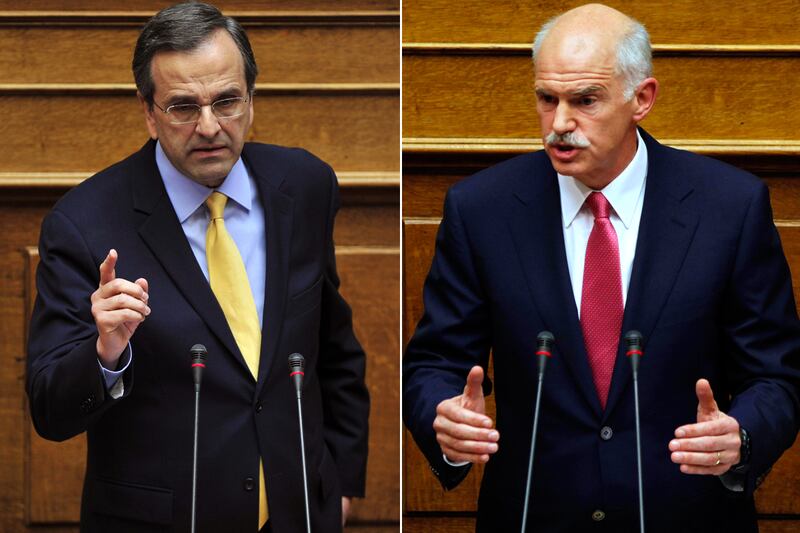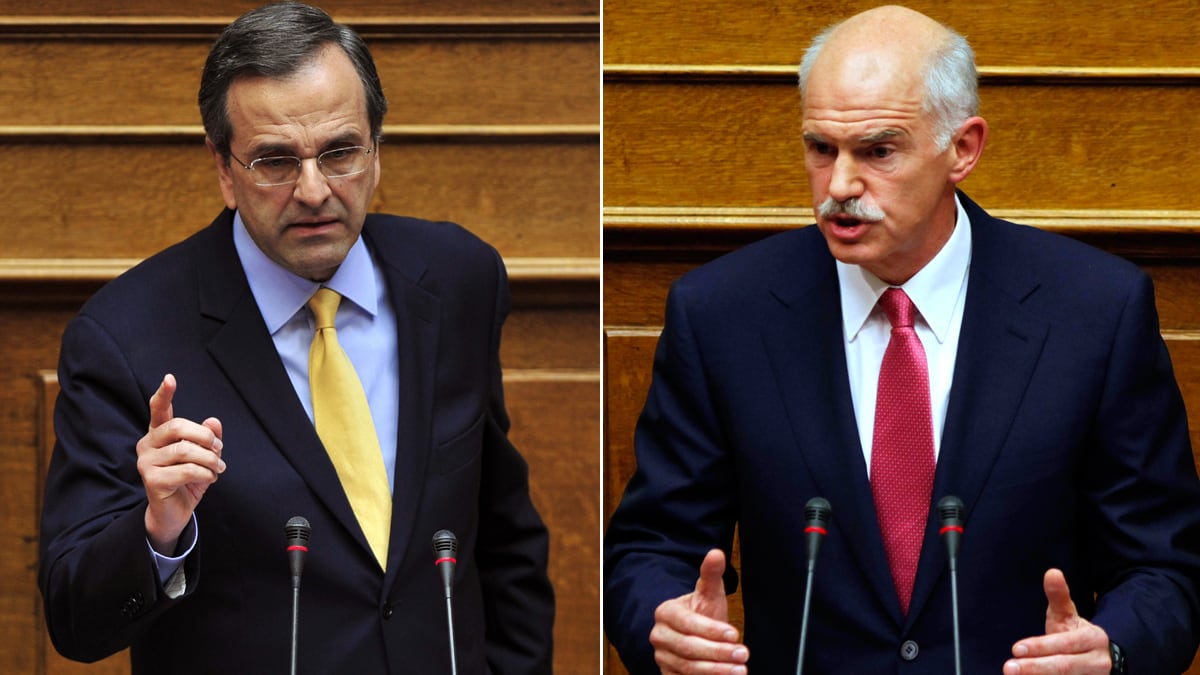Nearly 40 years ago, two young Greek expatriates at Amherst College in Massachusetts used to joke about combining their talents to topple the military junta in Greece and rule the country themselves. Things have not quite turned out as harmoniously as those two young friends dreamed. With Prime Minister George Papandreou reportedly agreeing to step down—despite eking out an unexpected win in a late-night no-confidence vote—things have turned out differently: one of those men has instead toppled his friend’s government.
The leader of the coup against Papandreou is Antonis Samaras. Pals since their high-school days at a tony Athens prep school, Samaras and Papandreou formed an unlikely friendship. The latter, scion of a well-known political dynasty, was an introspective guitar-strumming flower child with liberal leanings. Samaras was more formal, known for his snazzy blazers, effortless charisma, and conservative politics. But while their political beliefs have seldom overlapped, their friendship remained steadfast.
In the last few months, it’s been the reverse. While Papandreou seems to have brought Samaras into political alignment with him by forcing Samaras to come out in favor of a European Union-backed bailout plan for Greece, the pair’s relationship is more strained than ever. “He’s lying, he’s blackmailing, maneuvering inside Greece and beyond, all in order to hold on to his position,” Samaras sniped on Thursday. “We are bearing a cross and, on top of that, they are throwing stones at us,” Papandreou sniped back, accusing his opponent of “spreading nebulous and vacuous criticism” and “fearing the will of the people.”
The climax came in June, when Papandreou and Samaras entered secret negotiations on a national unity government including the prime minister’s Socialist Party and Samaras’ New Democracy. Samaras was game, but insisted that Papandreou would have to stand down, to be replaced by a non-partisan interim premier. The new leader would oversee implementation of austerity measures mandated by the bailout and avoid partisan bickering—although the truth is that both sides wanted to avoid being in charge of implementing the wildly unpopular steps. After that, new elections would choose a government.

When news of the talks leaked to the press, however, Papandreou abruptly pulled out, spurring a round of bitter recriminations. “The bid to form some sort of coalition government really was the nail in the coffin of their friendship,” says Nick Malkoutzis, deputy editor of the Kathimerini English Edition, an Athens daily. “Samaras basically accused Papandreou of holding on to the premiership because he feels he’s entitled. There was no turning back at that point.”
Not everyone agrees. Philip Tsiaras, an artist now based in New York, was a member of a circle of Greek students at Amherst, where he knew both men, and says the conflict will blow over in time. “I don’t think they are going to be calling each other to go to dinner any time soon,” Tsiaras says, “but I think that they are friends without question.”
The troubled bromance could not have erupted into bitterness at a worse time for the European and world economies. With the two old friends duking it out for the reins of power, European leaders have had to sit back and wonder which Amherst College alumnus they will be dealing with in Athens. The personal conflict has made an already complicated situation as easy to navigate as the Minotaur’s labyrinth.
Deeply in-debt Greece has been forced to accept a bailout package sponsored by the EU and the International Monetary Fund, but many citizens object strenuously to the steep spending cuts it imposes. New Democracy has criticized the plan, arguing that Greece should dig its way out of debt with economic growth rather than massive cuts. It’s the sort of rhetoric one would expect from left-wingers like Papandreou and the Socialists, and while it’s what they once advocated, the government—dependent on Europe—has little room to maneuver.
Caught in the middle, Papandreou this week announced a surprise referendum on the measures, though no one seems to understand what he intended to gain from it.
It was “an act of desperation,” says Professor Erik Jones, director of Johns Hopkins’s Bologna Institute for Policy Research. Perhaps Papandreou hoped to drive a harder bargain with Europe, following the template of Iceland, which twice rejected bailout deals. Or perhaps he simply wanted to call New Democracy’s bluff, forcing them to back the EU plan. “One could argue that Samaras has come over to the government because that’s preferable to the chaos that would ensue if they went to a vote,” Jones says.
With New Democracy’s support for the plan assured, Papandreou yanked the referendum, but the political victory was short-lived. His rapid flip-flop made him look impulsive and mercurial. Despite winning the no-confidence vote 153-145, he has said he will now ask the president to form a unity government, likely with a different prime minister. According to some reports, he will step aside to allow Finance Minister Evangelos Venizelos to form a coalition government.
What comes next is unclear. One likely scenario is the formation of a non-partisan technocratic government. A caretaker administration could work with European leaders and disburse the next tranche of bailout money. Later, elections would be held. “That means that when people complain about the really harsh austerity measures, the politicians will be able to put the blame on the technocrats,” Malkoutzis says.
Alternatively, elections could be held sooner, but it’s unclear who could form a government. Although the Socialists have been severely weakened, New Democracy would likely fail to reach a majority and would be forced to form a coalition government. Samaras seems destined to be prime minister soon; the question is when, and under what circumstances.
Regardless of the result, Papandreou seems destined for indefinite—and perhaps permanent—political exile. It’s a bitter irony, for Papandreou’s life has been shaped by the fact that his family was in genuine exile in the U.S. when he was born. Both his father and grandfather were also prime ministers, but he was born in Minnesota during the junta’s rule. While he was born into politics, Samaras was born to be in politics. “Antonis is an amazing politician, a natural born,” Tsiaras says. “You shake his hand and you feel you’ve known him your whole life.”
Tsiaras says one reason he believes the men’s friendship will endure is that it’s hard to tell just how angry Samaras is. He suspects much of it is political posturing. “Antonis has behind him an aggressive party that wants to get elected—think of the Tea Party behind him and what kind of pressure that would be,” he says. “And people know that they went to school together and they are friends, so he may have to react even stronger just to satisfy his right-wing constituency.”
But Samaras has always been a hard-charging politician. In 1992, he brought down a New Democracy government when he resigned over his hardline stance in a dispute with Macedonia, and he is eager to be premier—although now may not be the time he hoped to take over.
Papandreou’s motivations are more enigmatic. His opponents have accused him of staying past his due date, although he insists he’s not “clinging to his seat.” Says Malkoutzis, “I don’t think Papandreou will be able to come anywhere near Greek politics again. That’s probably why he’s so reluctant to give up power, because it’s all he’s known, all his life.”
Tsiaras demurs. “George has always had issues of indecision. It’s one thing when you’re a college student deciding an aesthetic thing, but it’s another when the country has a gun to its head.” As a result, leaving office may be “a great relief.”
His next step is unclear. Papandreou was a well-liked foreign minister, and has talked about his desire to work on securing peace on conflict-ridden corners of the globe. Perhaps he will leave Greece for a time to seek reconciliation between warring parties abroad. It could be good practice for repairing his own fractured friendship with Antonis Samaras.
With Nina Strochlic and Stefan Theil





